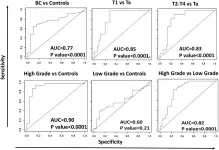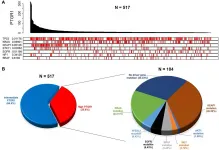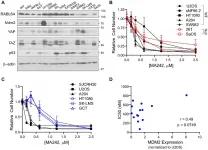(Press-News.org) A study of 1,095 patients hospitalized with COVID-19 discovered that two easily measurable signs of health - respiration rate and blood-oxygen saturation - are distinctly predictive of higher mortality. Notably, the authors said, anyone who receives a positive COVID-19 screening test can easily monitor for these two signs at home.
This context is lacking in current guidance from the Centers for Disease Control and Prevention, which tells people with COVID-19 to seek medical attention when they experience overt symptoms such as "trouble breathing" and "persistent pain or pressure in the chest" - indications that may be absent even when respiration and blood oxygen have reached dangerous levels, the authors say.
"These findings apply to the lived experience of the majority of patients with COVID-19: being at home, feeling anxious, wondering how to know whether their illness will progress and wondering when it makes sense to go to the hospital," said Dr. Neal Chatterjee of the University of Washington School of Medicine.
Chatterjee and fellow cardiologist Dr. Nona Sotoodehnia were co-lead authors of the paper, which was to be published May 24 in the journal Influenza and Other Respiratory Viruses.
They said the findings suggest that, for some people with COVID-19, by the time they feel bad enough to come to the hospital, a window for early medical intervention might have passed.
"Initially, most patients with COVID don't have difficulty breathing. They can have quite low oxygen saturation and still be asymptomatic," said Sotoodehnia. "If patients follow the current guidance, because they may not get short of breath until their blood oxygen is quite low, then we are missing a chance to intervene early with life-saving treatment."
The researchers examined the cases of 1,095 patients age 18 and older who were admitted with COVID-19 to UW Medicine hospitals in Seattle or to Rush University Medical Center in Chicago. The study span was March 1 to June 8, 2020. The lone exclusions were people who chose "comfort measures only" at time of their admission.
While patients frequently had hypoxemia (low blood-oxygen saturation; 91% or below for this study) or tachypnea (fast, shallow breathing; 23 breaths per minute for this study), few reported feeling short of breath or coughing regardless of blood oxygen.
The study's primary measure was all-cause in-hospital mortality. Overall, 197 patients died in the hospital. Compared to those admitted with normal blood oxygen, hypoxemic patients had a mortality risk 1.8 to 4.0 times greater, depending on the patient's blood oxygen levels. Similarly, compared to patients admitted with normal respiratory rates, those with tachypnea had a mortality risk 1.9 to 3.2 times greater. By contrast, other clinical signs at admission, including temperature, heart rate and blood pressure, were not associated with mortality.
Nearly all patients with hypoxemia and tachypnea required supplemental oxygen, which, when paired with inflammation-reducing glucocorticoids, can effectively treat acute cases of COVID-19.
"We give supplemental oxygen to patients to maintain blood oxygen saturation of 92% to 96%. It's important to note that only patients on supplemental oxygen benefit from the life-saving effects of glucocorticoids," Sotoodehnia said. "On average our hypoxemic patients had an oxygen saturation of 91% when they came into the hospital, so a huge number of them were already well below where we would've administered life-saving measures. For them, that care was delayed."
The findings have relevance for family-medicine practitioners and virtual-care providers, who typically are first-line clinical contacts for people who have received a positive COVID-19 test result and want to monitor meaningful symptoms.
"We recommend that the CDC and [World Health Organization] consider recasting their guidelines to account for this population of asymptomatic people who actually merit hospital admission and care," Chatterjee said. "But people don't walk around knowing WHO and CDC guidelines; we get this guidance from our physicians and news stories."
Sotoodehnia recommended that people with positive COVID-19 test results, particularly those at higher risk of adverse outcomes due to advanced age or obesity, buy or borrow a pulse oximeter and monitor for blood-oxygen below 92%. The clip-like devices fit over a fingertip and can be purchased for under $20.
"An even simpler measure is respiratory rate - how many breaths you take in a minute. Ask a friend or family member to monitor you for a minute while you're not paying attention to your breathing, and if you hit 23 breaths per minute, you should contact your physician," she said.
INFORMATION:
New research indicates that certain anti-cancer therapies may hasten cellular aging, where changes in the DNA of patients may contribute to greater inflammation and fatigue. The findings are published by Wiley early online in CANCER, a peer-reviewed journal of the American Cancer Society.
Gene activity is often adjusted during life through epigenetic changes, or physical modifications to DNA that do not involve altering the underlying DNA sequence. Some individuals may experience epigenetic age acceleration (EAA) that puts them at a higher risk of age-related ...
Oncotarget published "Urine protein biomarkers of bladder cancer arising from 16-plex antibody-based screens" which reported that the current study examines urine samples from 66 subjects, comprising of 31 Urology clinic controls and 35 bladder cancer patients, using a Luminex based screening platform.
ELISA validation was carried out for the top 4 prospective urine biomarkers using an independent cohort of 20 Urology clinic controls and 60 bladder cancer subjects.
Eight of these urine proteins were able to differentiate BC from control urine with ROC AUC values exceeding 0.70 at p < 0.0001, with specificity values exceeding 0.9. Upon ELISA validation, urine IL-1α, IL-1ra, and IL-8 were able to distinguish ...
Oncotarget published "The acylfulvene alkylating agent, LP-184, retains nanomolar potency in non-small cell lung cancer carrying otherwise therapy-refractory mutations" which reported that KEAP1 mutant NSCLCs further activate NRF2 and upregulate its client PTGR1. LP-184, a novel alkylating agent belonging to the acylfulvene class is a prodrug dependent upon PTGR1.
The authors hypothesized that NSCLC with KEAP1 mutations would continue to remain sensitive to LP-184. LP-184 demonstrated highly potent anticancer activity both in primary NSCLC cell lines and in those originating from brain metastases of primary lung cancers.
LP-184 activity correlated with PTGR1 transcript levels but was independent of mutations in key oncogenes and tumor ...
Oncotarget published "Prognostic and therapeutic value of the Hippo pathway, RABL6A, and p53-MDM2 axes in sarcomas" which reported that herein the authors evaluate expression of TAZ and YAP, the p53-MDM2 axis, and RABL6A, a novel oncoprotein with potential ties to both pathways, in sarcomas of different histological types.
Immunohistochemical staining of a tissue microarray including 163 sarcomas and correlation with clinical data showed that elevated YAP and TAZ independently predict worse overall and progression-free survival, respectively.
In the absence of p53 expression, combined TAZ and YAP expression adversely affect overall, progression free, and metastasis free survival ...
Regular consumption of milk is not associated with increased levels of cholesterol, according to new research.
A study published in the International Journal of Obesity looked at three large population studies and found that people who regularly drank high amounts of milk had lower levels of both good and bad cholesterol, although their BMI levels were higher than non-milk drinkers. Further analysis of other large studies also suggests that those who regularly consumed milk had a 14% lower risk of coronary heart disease.
The team of researchers took a genetic approach to milk consumption by looking at a variation in the lactase gene associated with digestion of milk sugars known as lactose.
The study identified that having the genetic variation where people can digest ...
Press release - Abstract 1394: Alterations in clock genes expression in Eutopic and Ectopic Endometrial Tissue
New research suggests that night shift work is linked to menstrual irregularity and increased chance of developing endometriosis
According to a study being presented at the 23rd European Congress of Endocrinology (e-ECE 2021), on Sunday 23 May at 19:00 CET (http://www.ece2021.org), women working night shifts may be at a greater risk of menstrual irregularity and developing endometriosis. The research found a reduction in the expression of PER-2, CRY-1 and CLOCK genes along with an increase in REV-ERBb in ectopic compared to ...
Bethesda, MD (May 23, 2021) -- Patients' irritable bowel syndrome (IBS) symptoms unexpectedly improved when they were under COVID-19 stay-at-home orders, reaffirming the gut-brain connection in functional gastrointestinal disorders, according to research that was selected for presentation at Digestive Disease Week® (DDW) 2021.
"One of our main hypotheses was that these patients were going to be worse because of pressure and stress due to COVID-19," said Juan Pablo Stefanolo, MD, a lead author on the study and a physician with the Neurogastroenterology and Motility section, Hospital de Clínicas José de San Martín, ...
Bethesda, MD (May 22, 2021) -- An artificial intelligence tool under development at Duke University can be added to the standard toilet to help analyze patients' stool and give gastroenterologists the information they need to provide appropriate treatment, according to research that was selected for presentation at Digestive Disease Week® (DDW) 2021. The new technology could assist in managing chronic gastrointestinal issues such as inflammatory bowel disease (IBD) and irritable bowel syndrome (IBS).
"Typically, gastroenterologists have to rely on patient self-reported information about their stool to help determine the cause of their ...
Tokyo, Japan - Researchers from Tokyo Metropolitan University have been quantifying how different batches of mesenchymal stem cells respond to the mechanical stiffness of their environments. They focused on how certain proteins were "localized" in cell nuclei and found key trends in how this changed with stiffness. Their findings explain inconsistencies between previous findings and may guide how scientists control the state of stem cells for research and medical treatments.
Mesenchymal stem cells (MSCs) are important "progenitor" cells that can transform into muscle, cartilage, bone or fat cells. In 2006, pioneering work by Engler and coworkers showed that they could control what cell type mesenchymal stem cells ...
Nearly half a billion people on the planet have diabetes, but most of them aren't getting the kind of care that could make their lives healthier, longer and more productive, according to a new global study of data from people with the condition.
Many don't even know they have the condition.
Only 1 in 10 people with diabetes in the 55 low- and middle-income countries studied receive the type of comprehensive care that's been proven to reduce diabetes-related problems, according to the new findings published in Lancet Healthy Longevity.
That comprehensive package of care ...



